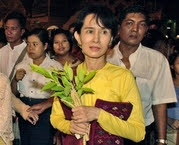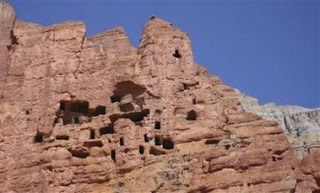Indonesian hardwood on brink of extinction: activists
Fri May 25, 6:25 AM ET
JAKARTA (AFP) - Activists urged the Indonesian government Friday to crackdown on exports of rare merbau, warning soaring global demand was pushing the tropical hardwood to the brink of extinction.
Greenpeace said merbau would be extinct within three decades unless Indonesia strictly controlled shipments to Europe, China, Australia and New Zealand, where it is popular for decking and flooring.
"The Indonesian government should set up an international control mechanism to protect the species from extinction," Greenpeace campaigner Hapsoro told a press conference here.
Greenpeace said its research showed 83 percent of the forests containing merbau in Papua had already been logged or had been earmarked for logging, leaving just 17 percent untouched.
Once common in Asia and eastern Africa, merbau is now only found in significant quantities in Indonesia's Papua and Papua New Guinea, it says.
"Illegal and destructive logging, as well as continued trading of merbau, is still rampant. The international community must question Indonesia's seriousness on this matter," said Hapsoro.
He said the government should list merbau on CITES, the Convention on International Trade in Endangered Species, as a first step to controlling the trade. Traders would then need to gain permits for exports with strict quotas introduced, he said.
Indonesia currently bans export of complete merbau logs, but allows roughly sawn merbau to be shipped.
However Hapsoro said traders managed to get around the partial ban by hiding logs in containers falsely labelled as sawn timber. Thousands of logs were smuggled from Indonesia to China last year, he added.
"You can hardly find the wood domestically, most of the demand comes from outside the country, mainly because the wood is very expensive, reaching up to 600 dollars per cubic metre," said Hapsoro.
"We also call for companies that buy merbau to trace back the origins of the wood (to check) whether it is legally harvested," said Hapsoro.
The Swiss-based World Conservation Union (IUCN) lists merbau as "vulnerable and facing extinction in the wild in the medium-term future."
Greenpeace says Indonesia has lost more than 72 percent of its intact ancient forests and much of the rest is threatened by commercial logging and clearance for palm oil plantations.
Ten countries account for 80 percent of the world's primary forests, of which Indonesia, Mexico, Papua New Guinea and Brazil saw the highest losses in primary forest in the five years from 2000 to 2005, the UN Food and Agriculture Organisation said.
Serious Side of Life... Hot Spots Around The World.. Topics/Issues that touch my heart and soul...
Saturday, May 26, 2007
Friday, May 25, 2007
Myanmar extends house arrest for Suu Kyi

By AYE AYE WIN, Associated Press Writer
10 minutes ago
YANGON, Myanmar - Myanmar's military government on Friday extended the house arrest of pro-democracy leader Aung San Suu Kyi for another year, defying an outpouring of international appeals for the Nobel Peace Prize winner's freedom.
The 60-year-old Suu Kyi has spent more than 11 of the past 17 years in detention. She has been continually detained for the past four years, spending most of it confined to her residence in Yangon, Myanmar's biggest city.
Her current one-year detention order was due to expire Sunday and the extension had been widely expected despite calls by international groups and world leaders for Suu Kyi's freedom.
The government's action was not officially announced but was privately confirmed by security officials, speaking on condition of anonymity due to the matter's sensitivity.
The United Nations, the European Union and the U.S. government all repeated their previous calls for the release of Suu Kyi and other political prisoners, as well as for moves toward democracy in Myanmar.
The first sign of the extension came when neighbors saw a silver-gray Toyota with tinted windows enter Suu Kyi's compound at 3:55 p.m. They were assumed to be government officials because she is allowed no visitors. They stayed for about 10 minutes.
One official confirmed that the car carried officials who presented Suu Kyi with a new detention order. The detention order takes effect when it is read to the person concerned. The official asked that neither he nor his agency, which is concerned with security affairs, be named because he was not authorized to speak to the media.
Suu Kyi, the head of Myanmar's National League for Democracy party and daughter of Myanmar's martyred founding father, has been held continuously since May 30, 2003, when her motorcade was attacked by a pro-junta mob during a political tour of northern Myanmar. The government considers her a threat to public order and she is not allowed any telephone contact with the outside.
The junta took power in 1988 after crushing pro-democracy demonstrations in Myanmar, then known as Burma. It refused to hand over power when, on May 27, 1990, Suu Kyi's party won a general election by a landslide, insisting the country first needed a new constitution. Suu Kyi won the Nobel Peace Prize in 1991.
The military has continued to rule while persecuting members of the pro-democracy movement.
Worldwide supporters of Suu Kyi expressed disappointment — but not surprise — at her continued detention.
In Washington, the White House sharply criticized the junta.
"The United States condemns the generals ... for the extension of the house arrest of Nobel Laureate Aung San Suu Kyi," said Gordon Johndroe, spokesman for President Bush's National Security Council.
"The regime's unjustified, continued detention of Aung San Suu Kyi and the repression of other democratic activists must end," he said.
The Republican leader of the Senate, Mitch McConnell (news, bio, voting record), called the junta's decision inexcusable.
"Nothing more clearly reflects the predatory nature of this regime than its keeping this heroic Nobel Prize laureate under house arrest," he said in a statement. "It also demonstrates that more pressure rather than less needs to be exerted on this regime by the international community."
U.N. Secretary-General Ban Ki-moon "deeply regrets" the government's decision to extend Suu Kyi's detention "despite his direct appeal to Myanmar's senior leadership and the many public calls worldwide for her release," U.N. spokeswoman Michele Montas said in New York.
"He strongly believes that the sooner restrictions on Daw Aung San Suu Kyi and other political figures are lifted, the sooner Myanmar will be able to move toward inclusive national reconciliation, the restoration of democracy and full respect for human rights," Montas said.
Paulo Sergio Pinheiro, the U.N.'s human rights expert for Myanmar, criticized the junta as well for refusing humanitarian appeals concerning prisoners serving sentences as long as 70 years.
"They say they are moving ahead, but they continue to hold 1,200 political prisoners, including the main members of the opposition," he told The Associated Press by telephone from Cape Town, South Africa.
Germany, which holds the rotating EU presidency, said it "deeply condemns" the junta's decision.
Nyan Win, a spokesman for Suu Kyi's party, said the organization had not yet been able to confirm the decision. "However, if the detention is extended despite demands by the international community, this is a very uncivilized action," he said.
The military rulers have given no sign they intend to free Suu Kyi.
"We don't see any indication of her release despite demands from world leaders and unprecedented activity within the country," Mya Aye, a prominent member of Myanmar's 88 Generation Students' Group, said before Suu Kyi's extended detention was confirmed.
The 88 Generation group — named after the year in which the military brutally suppressed democracy protests — has in the past year picked up the mantle of opposition activism from Suu Kyi's party, which has become moribund in her absence.
In Thailand, home to many Myanmar exiles, a spokesman for a prominent opposition group denounced the new detention order.
"It's a very unlawful decision by the generals, so we are very frustrated. She is not a criminal and not a threat to national security," said Zin Linn of the National Coalition Government of the Union of Burma, a self-styled government-in-exile.
____
Friday, May 18, 2007
Chinese writing '8,000 years old'

Chinese archaeologists studying ancient rock carvings say they have evidence that modern Chinese script is thousands of years older than previously thought.
State media say researchers identified more than 2,000 pictorial symbols dating back 8,000 years, on cliff faces in the north-west of the country.
They say many of these symbols bear a strong resemblance to later forms of ancient Chinese characters.
Scholars had thought Chinese symbols came into use about 4,500 years ago.
The Damaidi carvings, first discovered in the 1980s, cover 15 sq km (5.8 square miles) and feature more than 8,000 individual figures including the sun, moon, stars, gods and scenes of hunting or grazing.
"We have found some symbols shaped like both pictures and characters," Li Xiangshi, a cliff carving expert at the North University of Nationalities in Ningxia Hui autonomous region, told Xinhua news agency.
"The pictographs are similar to the ancient hieroglyphs of Chinese characters and many can be identified as ancient characters."
Until the discovery, the earliest characters included 4,500-year-old inscriptions on pottery from Henan province in central China.
Thursday, May 03, 2007
Explorers find ancient caves, paintings in Nepal

By Gopal Sharma
KATHMANDU (Reuters) - Explorers have discovered a series of caves decorated with ancient Buddhist paintings, set in sheer cliffs in Nepal's remote Himalayan north, leaving archaeologists excited and puzzled.
An international team of scholars, archaeologists, climbers and explorers examined at least 12 cave complexes at 14,000 feet near Lo Manthang, a mediaeval walled city in Nepal's Mustang district, about 125 km (80 miles) northwest of Kathmandu.
The caves contain paintings that could date back as far as the 13th century, as well as Tibetan scripts executed in ink, silver and gold and pre-Christian era pottery shards.
"Who lived in those caves? When were they there, when were (the caves) first excavated and how did the residents access them, perched as they are on vertical cliffs?" asked Broughton Coburn, an American member of the survey team.
"It's a compelling, marvelous mystery."
Explorers from the United States, Italy and Nepal used ice axes and ropes to climb to the caves, cutting steps in the cliff face as they went.
"These findings underscore the richness of the Tibetan Buddhist religious tradition of this area -- stretching back nearly a millennium -- as well as the artistic beauty and wide geographical reach of Newari artists," said Coburn, an expert in Himalayan conservation and development.
Newaris are ethnic Nepalis renowned for skills in wall paintings and other forms of mostly Buddhist art.
The cave complexes are several hours walking distance apart. Some chambers were thought to have been used for burials, and there were also mounds archaeologists hope may hide further treasures.
There are about 20 openings in each complex, and their multiple floors are connected by vertical passages with rudimentary handholds or footholds, requiring some climbing skill to negotiate.
They contained stupas, decorative art and paintings depicting various forms of the Buddha, often with disciples, supplicants and attendants.
The site of recent findings lies north of Mount Annapurna, the world's tenth highest mountain.
Coburn said the artifacts remained unpillaged partly because the area has, until recently, been inaccessible.
One cave's mural paintings were executed in sub-tropical themes -- containing palm trees, billowing Indian textiles and birds as well as animals, he said.
"For Nepal, and for the Lobas, the people of northern Mustang, these are national treasures, and they need to be preserved and protected," Coburn said.
Government officials were upbeat.
"These are very hopeful findings and foreign explorers could be allowed to carry out further exploration in the area," said Prakash Darnal, senior archaeologist at the government's ministry of culture.
Few foreigners are currently allowed to visit the area.
http://news.yahoo.com/s/nm/20070503/wl_nm/nepal_dc
Subscribe to:
Posts (Atom)